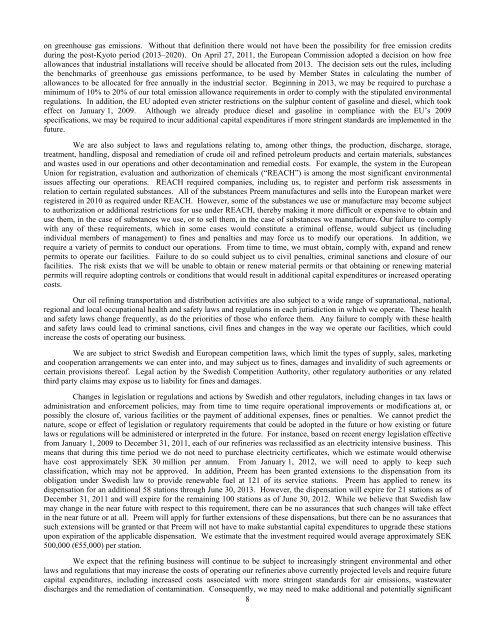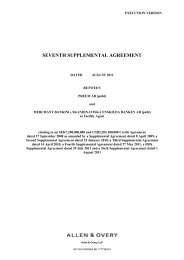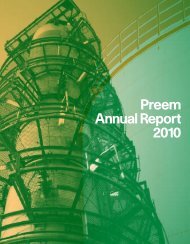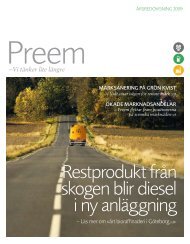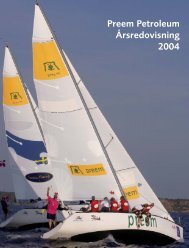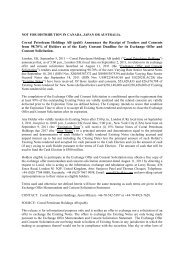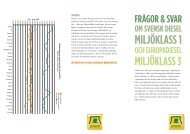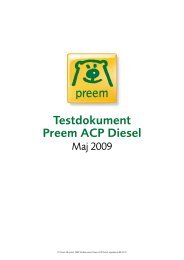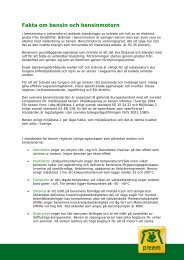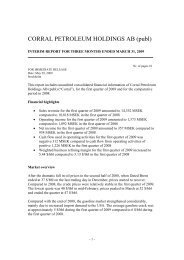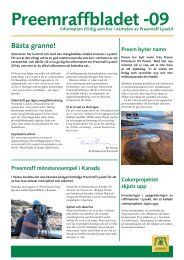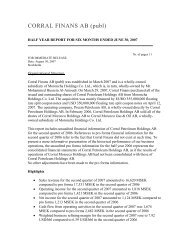Corral Petroleum Holdings AB (publ) Business Update ... - Preem
Corral Petroleum Holdings AB (publ) Business Update ... - Preem
Corral Petroleum Holdings AB (publ) Business Update ... - Preem
Create successful ePaper yourself
Turn your PDF publications into a flip-book with our unique Google optimized e-Paper software.
on greenhouse gas emissions. Without that definition there would not have been the possibility for free emission creditsduring the post-Kyoto period (2013–2020). On April 27, 2011, the European Commission adopted a decision on how freeallowances that industrial installations will receive should be allocated from 2013. The decision sets out the rules, includingthe benchmarks of greenhouse gas emissions performance, to be used by Member States in calculating the number ofallowances to be allocated for free annually in the industrial sector. Beginning in 2013, we may be required to purchase aminimum of 10% to 20% of our total emission allowance requirements in order to comply with the stipulated environmentalregulations. In addition, the EU adopted even stricter restrictions on the sulphur content of gasoline and diesel, which tookeffect on January 1, 2009. Although we already produce diesel and gasoline in compliance with the EU’s 2009specifications, we may be required to incur additional capital expenditures if more stringent standards are implemented in thefuture.We are also subject to laws and regulations relating to, among other things, the production, discharge, storage,treatment, handling, disposal and remediation of crude oil and refined petroleum products and certain materials, substancesand wastes used in our operations and other decontamination and remedial costs. For example, the system in the EuropeanUnion for registration, evaluation and authorization of chemicals (“REACH”) is among the most significant environmentalissues affecting our operations. REACH required companies, including us, to register and perform risk assessments inrelation to certain regulated substances. All of the substances <strong>Preem</strong> manufactures and sells into the European market wereregistered in 2010 as required under REACH. However, some of the substances we use or manufacture may become subjectto authorization or additional restrictions for use under REACH, thereby making it more difficult or expensive to obtain anduse them, in the case of substances we use, or to sell them, in the case of substances we manufacture. Our failure to complywith any of these requirements, which in some cases would constitute a criminal offense, would subject us (includingindividual members of management) to fines and penalties and may force us to modify our operations. In addition, werequire a variety of permits to conduct our operations. From time to time, we must obtain, comply with, expand and renewpermits to operate our facilities. Failure to do so could subject us to civil penalties, criminal sanctions and closure of ourfacilities. The risk exists that we will be unable to obtain or renew material permits or that obtaining or renewing materialpermits will require adopting controls or conditions that would result in additional capital expenditures or increased operatingcosts.Our oil refining transportation and distribution activities are also subject to a wide range of supranational, national,regional and local occupational health and safety laws and regulations in each jurisdiction in which we operate. These healthand safety laws change frequently, as do the priorities of those who enforce them. Any failure to comply with these healthand safety laws could lead to criminal sanctions, civil fines and changes in the way we operate our facilities, which couldincrease the costs of operating our business.We are subject to strict Swedish and European competition laws, which limit the types of supply, sales, marketingand cooperation arrangements we can enter into, and may subject us to fines, damages and invalidity of such agreements orcertain provisions thereof. Legal action by the Swedish Competition Authority, other regulatory authorities or any relatedthird party claims may expose us to liability for fines and damages.Changes in legislation or regulations and actions by Swedish and other regulators, including changes in tax laws oradministration and enforcement policies, may from time to time require operational improvements or modifications at, orpossibly the closure of, various facilities or the payment of additional expenses, fines or penalties. We cannot predict thenature, scope or effect of legislation or regulatory requirements that could be adopted in the future or how existing or futurelaws or regulations will be administered or interpreted in the future. For instance, based on recent energy legislation effectivefrom January 1, 2009 to December 31, 2011, each of our refineries was reclassified as an electricity intensive business. Thismeans that during this time period we do not need to purchase electricity certificates, which we estimate would otherwisehave cost approximately SEK 30 million per annum. From January 1, 2012, we will need to apply to keep suchclassification, which may not be approved. In addition, <strong>Preem</strong> has been granted extensions to the dispensation from itsobligation under Swedish law to provide renewable fuel at 121 of its service stations. <strong>Preem</strong> has applied to renew itsdispensation for an additional 58 stations through June 30, 2013. However, the dispensation will expire for 21 stations as ofDecember 31, 2011 and will expire for the remaining 100 stations as of June 30, 2012. While we believe that Swedish lawmay change in the near future with respect to this requirement, there can be no assurances that such changes will take effectin the near future or at all. <strong>Preem</strong> will apply for further extensions of these dispensations, but there can be no assurances thatsuch extensions will be granted or that <strong>Preem</strong> will not have to make substantial capital expenditures to upgrade these stationsupon expiration of the applicable dispensation. We estimate that the investment required would average approximately SEK500,000 (€55,000) per station.We expect that the refining business will continue to be subject to increasingly stringent environmental and otherlaws and regulations that may increase the costs of operating our refineries above currently projected levels and require futurecapital expenditures, including increased costs associated with more stringent standards for air emissions, wastewaterdischarges and the remediation of contamination. Consequently, we may need to make additional and potentially significant8


